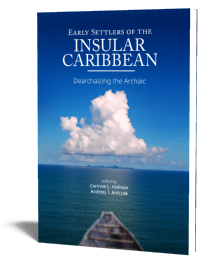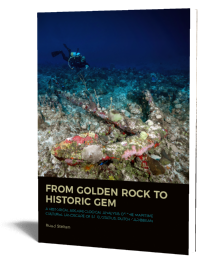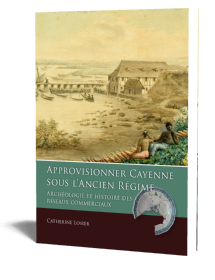Abstract:
The early-modern Venezuelan Caribbean did not lure seafarers with the saccharine delights of cane sugar but with the preserving qualities of solar sea salt. In this book, the historical archaeological study of this salty commodity offers a unique entryway into the hitherto unknown maritime mobilities and daily lives of the seafarers who camped at the saltpans of Venezuelan islands from the seventeenth to the late nineteenth centuries, cultivating and harvesting the white crystal of the sea.
For the first time, this study offers a comprehensive documentary history of the saltpans of La Tortuga Island and Cayo Sal in the Los Roques Archipelago, uncovering the surprising importance of their salt. Long-term archaeological excavations at the campsites by these saltpans have brought to light the plethora of material remains left behind by seafarers during their seasonal and temporary salt forays. The exhaustive analysis of the thousands of recovered things – pipes, punch bowls, plates, teapots, buttons, bones – contrasted with documentary evidence, not only enables us to understand where these things came from but also by whom they were used. By engaging the evidence through my theoretical framework of assemblages of practice, I demonstrate how seafarers and things were vibrantly entangled in the everyday assemblages of practice of salt cultivation, dining and drinking.
This multisited approach spanning 256 years, reveals that seafarers were fervent buyers of fashionable products, drinking hot tea from porcelain tea bowls, using colorful ceramic chamber pots for their hygienic needs and imbibing exotic rum punch by the scorching saltpans of the uninhabited Venezuelan islands. Intended for scholars, students and the interested public alike, this historical archaeological study positions humble seafarers in the limelight, not as the anonymous movers of international trade and facilitators of imperial interests, but as avid trans-imperial and extra-imperial consumers of the fruits of those very empires.
Awards
This book was awarded with the Fernando Coronil Prize 2022. This price for best book on Venezuela was awarded to Dr. Konrad Antczak by the Section of Venezuelan Studies of the Latin American Studies Association (LASA).
The jury report states that “based on exhaustive and rigorous archaeological research conducted on two small islands in the Venezuelan Caribbean, La Tortuga and Cayo Sal, and painstaking documentary research, Dr. Antczak offers an original and brilliant historical-archaeological study of sea salt cultivation in the Caribbean, and a clear, enjoyable and comprehensive account of the hitherto little-known sea voyages and lives of the seafarers who transited this region between the seventeenth and nineteenth centuries. […] For these reasons, the jury is pleased to award the 2022 Fernando Coronil Prize to Islands of Salt by Dr. Konrad Antczak.”
Contents
Chapter 1
Introduction: Islands of Salt
Chapter 2
Assemblages of Practice: A New Conceptual Framework
Chapter 3
Part I – Itineraries of Sea Salt: La Tortuga within the Atlantic World
Part II – Itineraries of Sea Salt: Cayo Sal within the Venezuelan Caribbean
Chapter 4
Crusty Salts: The Seafarers at the Venezuelan Saltpans
Chapter 5
Saltculture: Socio-Natural Assemblages of Practice on the Saltpans
Chapter 6
Part I – The Lived Saltpan: Assemblages of Practice at the Campsites of La Tortuga
Part II – The Lived Saltpan: Assemblages of Practice at the Campsites of Cayo Sal
Chapter 7
Entanglements at the Salty Margins of Modernity


Dr.
Konrad A. Antczak
Konrad A. Antczak is a Venezuelan and Polish historical archaeologist who received his PhD from The College of William and Mary in 2017. He is currently a Juan de La Cierva-Incorporación Researcher at the Departament d’Humanitats, Universitat Pompeu Fabra (UPF) in Barcelona, Spain, and Historical Archaeologist at the Unidad de Estudios Arqueológicos, Universidad Simón Bolívar in Caracas, Venezuela. He is author of Islands of Salt: Historical Archaeology of Seafarers and Things in the Venezuelan Caribbean, 1624–1880 (Sidestone Press, 2019).
read more












